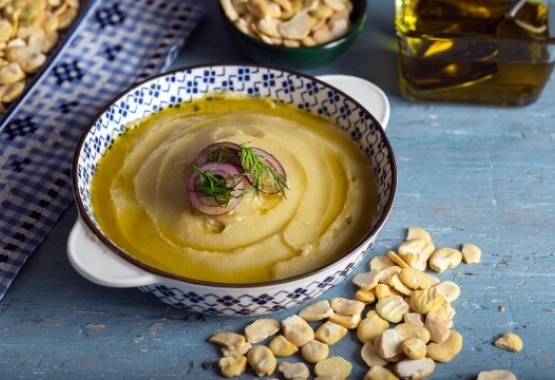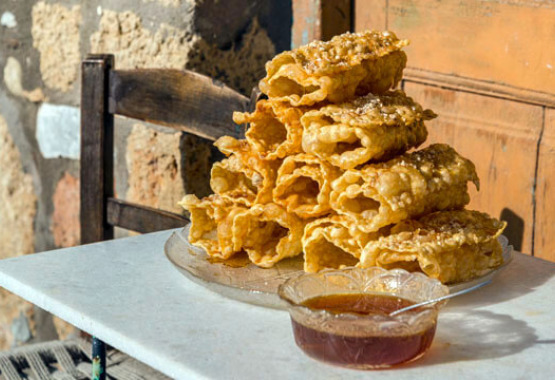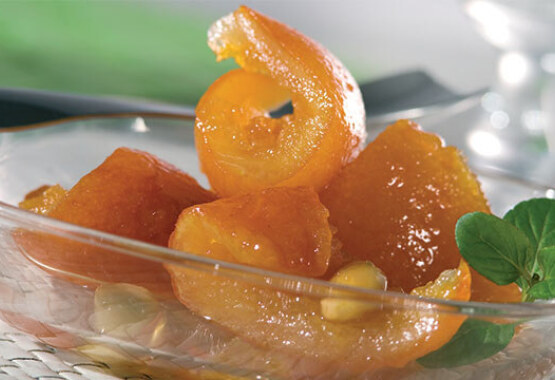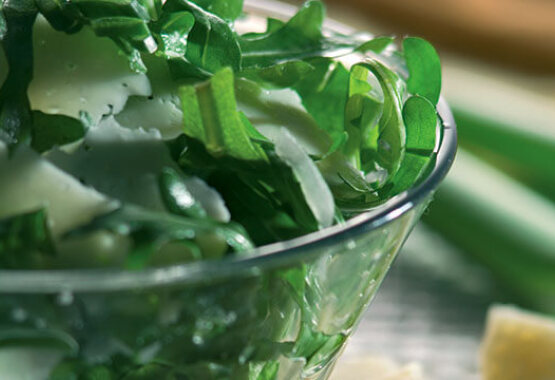
AROUND GREECE
Well-known and well-preferred within as well as beyond Greek borders, Epirus’ cuisine is about straightforward flavours and thanks to the fine quality of raw materials, local gastronomy offers a variety of delectable traditional dishes, complementing the region’s special cultural identity.
The great variety of local cheeses is owed to the area’s fresh goat and sheep milk and it is the result of a long tradition in cheese-making. Local feta cheese is really top quality; it is produced within a short distance from the ancient Delphi Oracle and the Dodoni amphitheatre and it ranks high among the top fetas in Greece. Other types of cheese include the smoked metsovone cheese, anthotyros (an almost salt-free cheese) or the spicier vasilotyri. You can also try galotyri, an incredibly creamy strong-tasting cheese. The hard and spicy kefalotyri is made from sheep and goat milk, and it is usually eaten grated on food. The salt-free Manouri is made from sheep milk or a mixture of sheep and goat milk.
Make sure you taste the vinegar made from local grape varieties such as Debina and Vlachiko, try the local trachana, tomato sauce, hot chilli pepper cheese and rabbit.
Tip: Traditional Epirote cooking involved the use of particular cookware; many of these items are still used today, namely tavas (a lidded baking dish), roasters and sagania (large pans for cooking on the fireplace).
The Epirus Cuisine
Tasteful simplicity
Epirus’ particular terrain, the mountainous areas, the sea, the climate and a centuries-old history have all played a part in creating countless dishes and tasty combinations that make up the local cuisine. Your journey to this part of Greece will turn into an unforgettable experience once you have savoured the culinary delights of this part of the country!Well-known and well-preferred within as well as beyond Greek borders, Epirus’ cuisine is about straightforward flavours and thanks to the fine quality of raw materials, local gastronomy offers a variety of delectable traditional dishes, complementing the region’s special cultural identity.
Quality products from Epirus
Local cuisine mainly uses ingredients found on the mountain and depends mostly on stock farming products: milk, yogurt, cheese, goat and sheep meat. Milk is the basic ingredient in the Epirus cuisine. It is used for the production of butter and buttermilk, yogurt and the famous local cheeses. Butter is another essential ingredient in the region’s cookery as olive trees do not thrive on this land.The great variety of local cheeses is owed to the area’s fresh goat and sheep milk and it is the result of a long tradition in cheese-making. Local feta cheese is really top quality; it is produced within a short distance from the ancient Delphi Oracle and the Dodoni amphitheatre and it ranks high among the top fetas in Greece. Other types of cheese include the smoked metsovone cheese, anthotyros (an almost salt-free cheese) or the spicier vasilotyri. You can also try galotyri, an incredibly creamy strong-tasting cheese. The hard and spicy kefalotyri is made from sheep and goat milk, and it is usually eaten grated on food. The salt-free Manouri is made from sheep milk or a mixture of sheep and goat milk.
Mouthwatering pies
Pies hold a central place in the region’s gastronomy and they are prepared either as a weekday meal or as a special dish on feast days. They can be simple and straightforward to make or complicated and requiring more skills, there are salty or sweet ones, made with or without phyllo, stuffed with all sorts of ingredients, seeing that in Epirus, practically everything can be made a pie: meat, fish, macaroni, greens, vegetables etc. So, take a pick: there are green pies, cheese pies, milk pies, leek pies, cabbage pies, minced meat pies, mushroom pies, macaroni pies and a host of other tasty culinary creations made from simple and inexpensive raw materials. The tasty outcome is a blend of the wisdom of household cookery and haute cuisine.Epirus’ culinary identity
Whether you choose an haute cuisine restaurant or a traditional off the beaten track taverna, one thing’s for sure: you will be served the best of what’s available, to make sure you are entirely satisfied. Small traditional little eateries (called koutouki) offer tasty appetisers, good wine and a sociable atmosphere; busy tsipouradika [tsipouro tavernas], gourmet restaurants, traditional cooking places are only a few suggestions off the long list of where and what to eat in Epirus. Try Molos, Ioannina town, by Pamvotida’s lakeside, where there are many fine restaurants; their location offers a fine view of the lake, the castle and Nisi [meaning Island] and you can taste local dishes such as frog legs, smoked trout or smoked eel. Try the mouthwatering local pies in Zagorochoria villages, taste the local sausage, kontosouvli and smoked metsovone cheese in Metsovo town.Make sure you taste the vinegar made from local grape varieties such as Debina and Vlachiko, try the local trachana, tomato sauce, hot chilli pepper cheese and rabbit.
Sweet temptations
Savoury syrupy sweets or phyllo pastries such as saragli, walnut cake, almond cake, flute shaped sweets from Metsovo, Sker Bourek, klostati (local baklava with walnut filling), and the well-known kantaifi from Ioannina are but a few of the sweets you can treat your palate to in Epirus. You wonder what the secret is: a successful combination of ingredients such as kantaifi threads, baklava dough sheets, walnuts, almonds and thick syrup. You can also try spoon sweets made from the fruits of the Epirus earth. Try chestnut, unripe (green) fig, blackberry, prune with wine and cinnamon, and vegetable marrow.Wines & distilled spirits
Next to good food, you must absolutely try the freshness, flavour and finesse of the Zitsa white wines. And if you are a fan of the red wines, you will find that the robust ones produced in mountainous Metsovo are wines with a strong personality that improve with age. Don’t forget to try the aged tsipouro (a type of spirit) and local cranberry and blackberry liqueurs.Tip: Traditional Epirote cooking involved the use of particular cookware; many of these items are still used today, namely tavas (a lidded baking dish), roasters and sagania (large pans for cooking on the fireplace).




